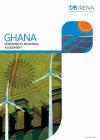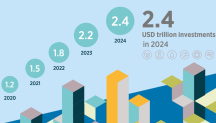

Renewables Readiness Assessment: Ghana
Newsletter
Ghana has one of Africa’s highest rates of access to electricity. In 2014 this was estimated at 72%, with over 87% in urban areas and nearly 50% in rural areas. The country also exports power to its neighbours, Togo, Benin and Burkina Faso. The Ghanaian power industry is unbundled, comprising generation utilities, transmission and distribution companies, and independent power producers.
In spite of this comparative success, annual demand growth of 10% calls for increased generation capacity. Disruptions in natural gas supply have reduced the output of thermal power plants. Since 2012, utilities have resorted to load shedding to meet the peak demand of 1,745 megawatts (MW).
Ghana’s rich array of renewable energy resources can address energy insecurity and help to expand energy access. These resources include, biomass, solar and wind energy, along with hydropower potential. Taxes on energy consumption are being used by the government to finance power development, including renewables. However, as this report finds, institutional and policy issues have constrained market development for renewable energy, including large hydropower.
A Renewables Readiness Assessment (RRA) identifies the actions needed to overcome a country’s barriers to renewable energy deployment, with the International Renewable Energy Agency (IRENA) providing technical support and expertise to facilitate consultations among different national stakeholders. While the process helps to shape appropriate policy and regulatory choices, each country determines which renewable energy sources and technologies are relevant and consistent with national priorities.




